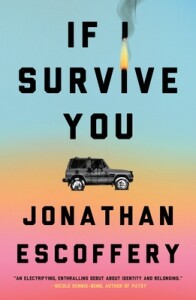
In this remarkable debut, the author gives us eight interconnected stories about a Jamaican-American family. Most of them center on Trelawny, the younger child, born after Topper and Sarah emigrated to Florida in the 1970s with Delano, their beloved first-born. Not only is Trelawny American in a way that the rest of his family is not, but he is also sensitive and bookish, earning scorn from his father and brother.
“In Flux” explores the complexity of race as Trelawny tries to find out what he is. His light-skinned parents were not considered Black in Jamaica, but he certainly is when he goes to college in the Midwest. That’s just the first layer, as he keeps peeling them back, showing both the obvious and the subtle workings of racism in the U.S.
In this, as in several other stories, the author makes extensive use of second-person point-of-view: addressing the reader directly as “you.” It’s an interesting choice. A fad for second person swept the literary world after the success of Jay McInerney’s Bright Lights, Big City and then quickly became tiresome.
Here it works by engaging the reader and creating a buzzing immediacy. The author avoids the doldrums with the vibrant energy of his prose, the precision of his depictions of the culture, and his irrepressible—if often dark—humor. It is also a good choice for someone who hasn’t yet figured out who he is or if he as a person actually exists.
The other characters are unforgettable: Cukie, whom Trelawny envies because he gets to spend a summer with his father learning lobstering; Jelly, whose racist family baits Trelawny in the strangest Thanksgiving dinner ever; Delano, who totally buys into his privilege as the preferred son and assumes the world will likewise deliver for him. One story, in Jamaican dialect, presents Topper as a young man deciding to emigrate to Florida.
Having just been reading the essay “Dysfunctional Narratives” by Charles Baxter, I couldn’t resist applying his thesis that too many books are about a young person identifying the trauma that damaged them when young—usually from their family—and has continued to ruin their lives. Writers sometimes refer to this as the protagonist’s wound.
But if that is all there is to the story, then readers lose interest. Most readers want to see characters who grow and “start to act like adults, with complex and worldly motivations.” I agree with Baxter that we want to see characters admit their mistakes, take responsibility for them, perhaps even justify them.
Trelawny, at least, does acknowledge his mistakes. And certainly he is a victim of so many circumstances: racial discrimination, poverty, his father’s oft-stated preference for Delano, even a hurricane that destroys their home. However, even with the humor and brilliant writing, I sometimes had to take a break from his woes as the victim also of less-than-loving girlfriends, weird jobs, his own mistakes.
If I had any doubt that men are in trouble, this book would have put them to rest. The women, once they’ve left their husbands, do well, but the men all flounder.
Still, I have to defend Trelawny’s sense of being a victim. I can’t speak to enduring racial discrimination, but I’ve been poor and Escoffery is right: when you’re poor, survival hangs by a most tenuous thread. If you have the emotional support of your family or your community or both, you can weave in some happy times, sweet moments, even a few successes. Without them, your outlook is pretty bleak.
As Trelawny says, “It occurs to you that people like you — people who burn themselves up in pursuit of survival — rarely survive anyone or anything.”
I am on the lookout for books of interconnected stories like this one, Jon McGregor’s Reservoir 13, and Disappearing Earth by Julia Phillips. Have you read a good book that uses that format?